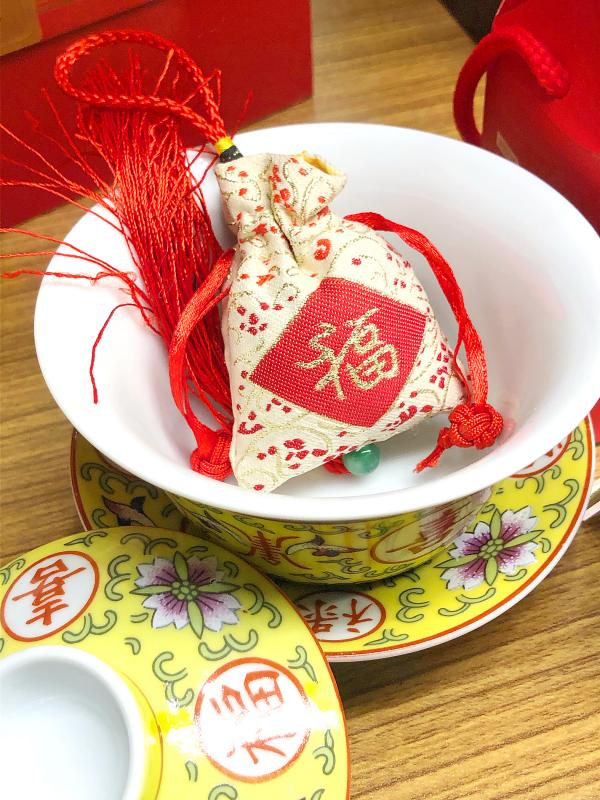Xiangbao (香包), or perfume sachets, could cause some people to develop an allergic rash, as most perfume sachets on the market are made using chemical fragrances, a dermatologist said on Friday.
Wearing perfume sachets is traditional during the Dragon Boat Festival, which fell on Thursday this year, but some people could develop contact dermatitis after touching them due to their ingredients, Cathay General Hospital dermatologist Yu Yu (俞佑) said.
Contact dermatitis occurs where an allergen comes into direct contact with the skin, Yu said, citing a recent case in which a three-year-old boy developed an itchy rash on his chest after wearing a perfume sachet given to him by his grandmother.

Photo: Luo Chi, Taipei Times
Symptoms develop quickly if the contact dermatitis results from an irritant, but an allergic reaction appears slowly, he said.
Mild contact dermatitis is characterized by redness or spots, as well as itchy and flaky skin, while severe contact dermatitis can result in oozing blisters and burning skin, Yu said.
Most cases of contact dermatitis caused by contact with perfume sachets are an allergic reaction, the symptoms of which usually appear days after initial contact, he said.
Although sachets made with traditional Chinese herbal medicine are safer than those made using artificial fragrances, contact dermatitis can also be caused by medicinal herbs, he said.
Among the herbal ingredients commonly used for sachets, cloves and mint can often cause skin allergies, while dahurian angelica, Atractylodes lancea, bay laurel and nutmeg have also been linked to skin allergies in academic papers, he said.
People found to have contact dermatitis should immediately get rid of all suspected allergens, he said, adding that applying topical corticosteroids helps.
People with more severe allergic reactions could consider taking oral antihistamines or corticosteroids to shorten their recovery, he added.

‘DENIAL DEFENSE’: The US would increase its military presence with uncrewed ships, and submarines, while boosting defense in the Indo-Pacific, a Pete Hegseth memo said The US is reorienting its military strategy to focus primarily on deterring a potential Chinese invasion of Taiwan, a memo signed by US Secretary of Defense Pete Hegseth showed. The memo also called on Taiwan to increase its defense spending. The document, known as the “Interim National Defense Strategic Guidance,” was distributed this month and detailed the national defense plans of US President Donald Trump’s administration, an article in the Washington Post said on Saturday. It outlines how the US can prepare for a potential war with China and defend itself from threats in the “near abroad,” including Greenland and the Panama

A magnitude 4.9 earthquake struck off Tainan at 11:47am today, the Central Weather Administration (CWA) said. The hypocenter was 32.3km northeast of Tainan City Hall at a depth of 7.3km, CWA data showed. The intensity of the quake, which gauges the actual effect of a seismic event, measured 4 in Tainan and Chiayi County on Taiwan's seven-tier intensity scale, the data showed. The quake had an intensity of 3 in Chiayi City and County, and Yunlin County, while it was measured as 2 in Kaohsiung, Nantou County, Changhua County, Taitung County and offshore Penghu County, the data showed. There were no immediate reports of

The Chinese Nationalist Party (KMT) is maintaining close ties with Beijing, the Democratic Progressive Party (DPP) said yesterday, hours after a new round of Chinese military drills in the Taiwan Strait began. Political parties in a democracy have a responsibility to be loyal to the nation and defend its sovereignty, DPP spokesman Justin Wu (吳崢) told a news conference in Taipei. His comments came hours after Beijing announced via Chinese state media that the Chinese People’s Liberation Army’s Eastern Theater Command was holding large-scale drills simulating a multi-pronged attack on Taiwan. Contrary to the KMT’s claims that it is staunchly anti-communist, KMT Deputy

RESPONSE: The government would investigate incidents of Taiwanese entertainers in China promoting CCP propaganda online in contravention of the law, the source said Taiwanese entertainers living in China who are found to have contravened cross-strait regulations or collaborated with the Chinese Communist Party (CCP) could be subject to fines, a source said on Sunday. Several Taiwanese entertainers have posted on the social media platform Sina Weibo saying that Taiwan “must be returned” to China, and sharing news articles from Chinese state media. In response, the Mainland Affairs Council (MAC) has asked the Ministry of Culture to investigate whether the entertainers had contravened any laws, and asked for them to be questioned upon their return to Taiwan, an official familiar with the matter said. To curb repeated